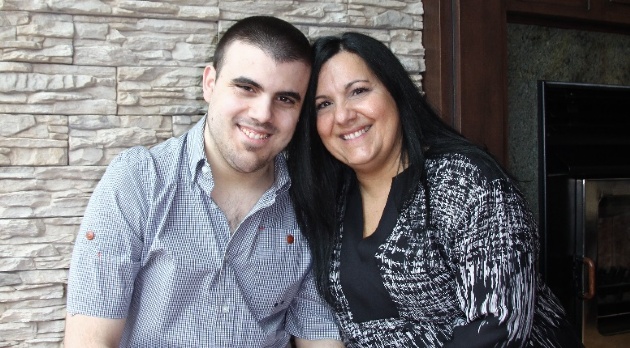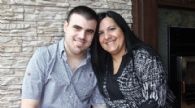As Julian Miozzi, a 20-year-old young man sits across the table, he shares his dream of one day being the owner of an animation business. This would be quite an ordinary scene except that Julian Miozzi is not an ordinary person. When Julian was two, he was diagnosed with severe autism and mental retardation. His parents Nina and Joe were told he would never speak. Yet, fast forward eighteen years and he sits speaking quite eloquently about what parts of his business he can run himself and what parts he would need to hire someone for. When he hesitates and verbalizes that he might not be capable to do this, Nina, sitting next to him, jumps right in and tells him to never say anything is impossible, because everything is possible.
Nina has had that attitude from the day she received her son’s diagnosis. She had brought this child’s abnormal behaviour to the doctor’s attention. Before eighteen months, Julian would say a few words and interact like any infant normally would. Suddenly, he stopped making eye contact, he stopped speaking and he started acting strangely, flapping his hands and jumping while watching television. Nina knew something was wrong. When she and Joe were told that this boy would never speak or behave in a normal way, Nina made a choice within herself. She would help this boy be all that he could be. Although many people might be influenced by experts that tell them their child will never develop further, Nina was not so easily convinced. She heard what they told her but she also watched her son closely.
“The sign that first led me to know that my son was still there happened when I was putting him to sleep. I was rocking him and singing a lullaby and he kept looking at me. I saw him making movements with his mouth. I thought to myself there’s something there, he understands me, he sees me, I know he’s there. So from then on I was determined to find a way. They say that they [autistic children] go into their own little world and I did see that happening with Julian, but he always had a connection with me. We had a communication without any language and I used that.”
While Joe was busy with the family business, Nina was the family’s caregiver. Julian is their middle child, Tessa is three years older and Luca six years younger than Julian. How this boy that was never supposed to speak or function became this well-rounded and capable young man is a story that might appear magical to someone looking in from the outside. Nina however tells a story of faith, hard work, frustration, and incredibly beautiful moments.
“I always tell everyone that the progress we were making meant taking two steps forward, one step back, three steps forward, two steps back. It was never simply going forward like 3 steps at a time. It was never that way.”
Back when Julian was diagnosed, autism was almost unheard of. Nina did not have an easy time finding services to help him. Just like taking on any new endeavor that is filled with unknowns, the process meant trying different approaches and therapies to find what would help but many failed. Nina remembers many doors closing without support or help, but as the saying goes, when one door closes another one opens. Her determination grew with every failed attempt. She eventually and by serendipity while watching television one day, found the treatment that would create breakthroughs. Nina began working with Dr. Sylvie Bernard, a psychologist in Applied Behaviour Analysis. Together they created a rigorous program to reach Julian. It was challenging because at first he would not interact or understand what they asked of him. They had to teach him all the basic tasks developing children would normally learn on their own. Things like clapping his hands or sitting on a chair meant weeks of repeating the steps until Julian was able to do them on his own. Nina felt frustrated at times because there were periods with no visible progress. She also knew she would need help because this was a very demanding undertaking. She formed a team consisting of some college aged neighborhood young women and a young man that was initially hired to cut her grass. The team was varied so Julian could have as complete a learning experience as possible, and Nina taught these young adults to help Julian practise the desired behaviours that the treatment demanded on a consistent schedule. Nina was relentless. Her team worked hand in hand and met regularly to discuss and align their strategy on how to best work with Julian. With tough love and persistence, they slowly but surely started to see results.
When Julian was of age to start school, they were directed towards an institution that had programs for special needs children. Nina immediately saw regression in her boy and she attempted to work with the school to help them teach her son as she had been doing. She became frustrated when the classroom had many children with differing special needs and her son who did not have the ability to express himself verbally, lost out. He regressed and eventually she decided to home-school him for a short while. The setup consisted of a basement turned into kindergarten class, play dates with friends and their children and a consistent work schedule to ensure her boy learned the motor and verbal skills most boys his age already knew. The first words uttered by Julian brought tears of joy to all who were present. He was six.
Eventually he went on to a regular school with a shadow and a technician (which assist educators with autistic children). Nina was present all along, volunteering as much time as possible to ensure that her son was being challenged to his full capabilities. She never lost sight of who her son was. If she felt the educators or experts did not teach this boy adequately, she took matters into her own hands. Being so attentive meant that she was able to address any issue that arose with her son’s behaviour or any problematic social interaction and she was able to do so quickly. She entered classrooms and taught older children how to help Julian instead of making fun of him. This gave the older children tools and helped them rise to a higher standard instead of making fun of what they feared or didn’t understand. Eventually though, she did take Julian out when she felt that the school was not providing the learning support or safety she wanted for her son but she never gave up on helping him advance further.
The last frustration was at the high school level where her son would never receive credit or a diploma for graduating from high school. Nina had fought the system so hard and for so long that she felt depleted. She needed to take a step back. She allowed Julian to complete the work program that many autistic high school students complete. In this time she had Julian psychologically evaluated to see if the system was right and her son had reached the maximum capacity of his learning ability. It was confirmed that Julian still had much capacity to go further. Today she home-schools her son and intends in the next four or five years to see him graduate from high school.
Nina shares an incredible amount of wisdom from the experience of raising this boy. She has had to deal with family members that struggled with this boy’s disorder, she has had to deal with others that did not understand why he behaved as he did but she never felt sorry for him or herself. She was empowered to find solutions and offer this boy the best quality of life he can have given the struggles he faced. Having a boy like Julian has meant having to slow life down. This family of five had to work through the strain and stress that such a situation causes on a family. They are now closer than ever and everyone sees Julian just like any other family would see a sibling or child. There is no special treatment for him because he is autistic. They enjoy being together and care deeply for one another. Nina appreciates her son and who he has grown up to be. She recognizes every small step he makes and tells him often that she’s proud of him. They have an incredible bond.
Nina very assuredly states that what has kept her strong and on course through the whole process of getting Julian to this stage is her faith in God. She knew God had given her the strength to face this and work through it. So when people said things that would limit her son or when her closest circle was not always supporting her through it, she felt supported within. Filled with that knowing, she became the instrument that allowed Julian Miozzi to have a voice today, to express his loves, his hates, his dreams and to keep learning. She still continues by teaching him mathematics at their kitchen table every day. Nina has complemented any educational or government program that Julian took part in to ensure her son developed to his full capacity. This will continue well into his twenties. Other autistic young adults are not as lucky. In Quebec, people like Julian no longer have any government assisted educational or support programs once they turn 21 and very few options once they turn 18. This removes many possibilities for those that are not as lucky as Julian and do not have a family to support their learning or advancement. How unfortunate would it be for young autistic adults that show the aptitude that Julian has shown but will never have such opportunities?
Nina never defined Julian as the autism he lives with, she always saw a boy with so much potential. She has made it her mission to make sure he is able to use that potential to be the best Julian can be. The most beautiful gift any parent could offer their children is to unconditionally encourage and support them to be all that their natural talents and gifts allow them to be, with an added firm and loving push when the going gets tough. Nina and Julian are perfect examples how belief in who a child is, hard work and faith will make any child flourish and accomplish great things.

 In The Latest Issue:Latest Issue:
In The Latest Issue:Latest Issue:
- A Bittersweet Farewell
- The new Laval Aquatic Co...
- The End of an Era:
Articles
Calendar
Virtual- ANNUAL TEACHER APPRECIATION CONTEST
- APPUI LAVAL
- ARTS & CULTURE
- CAMPS
- CAR GUIDE
- CCIL
- CENTENNIAL ACADEMY
- CHARITY FUNDRAISING
- CITYTV
- COSMODÔME
- COMMUNITY CONNECTIONS
- COVER STORY
- DINA DIMITRATOS
- ÉCOLE SUPÉRIEURE DE BALLET DU QUÉBEC
- EDITORIALS
- ÉDUCALOI
- EDUCATION
- EMPLOYMENT & ENTREPRENEURSHIP
- FÊTE DE LA FAMILLE
- FÊTE DU QUARTIER SAINT-BRUNO
- FAMILIES
- FESTIVAL LAVAL LAUGHS
- FÊTE DE QUARTIER VAL-DES-BRISES
- FINANCES
- GLI CUMBARE
- GROUPE RENO-EXPERT
- HEALTH & WELL-BEING
- 30 MINUTE HIT
- ANXIETY
- CHILDREN`S HEALTH & WELLNESS
- CLOSE AID
- DENTAL WELLNESS
- EXTREME EVOLUTION SPORTS CENTRE
- FONDATION CITÉ DE LA SANTÉ
- GENERAL
- HEARING HEALTH
- MESSAGES FROM THE HEALTH AGENCY OF CANADA
- MENTAL HEALTH
- SEXUALITY
- SOCIAL INTEGRATION
- SPECIAL NEEDS
- TEENS
- THE NUTRITION CORNER
- THE NUTRITION CORNER - RECIPES
- VACATION DESTINATION
- WOMEN'S FITNESS
- WOMEN'S HEALTH
- HILTON MONTREAL/LAVAL
- HOME & GARDEN
- INTERNATIONAL WOMEN'S DAY
- JAGUAR LAVAL
- LAVAL À VÉLO
- LAVAL FAMILIES TV SHOW
- LAVAL FAMILIES MAGAZINE CARES
- LAVAL URBAN IN NATURE
- LE PARCOURS DES HÉROS
- LES PETITS GOURMETS DANS MA COUR
- LEON'S FURNITURE
- LEONARDO DA VINCI CENTRE
- LFM PREMIERES
- LIFE BALANCE
- M.P. PROFILE
- MISS EDGAR'S AND MISS CRAMP'S SCHOOL
- MISSING CHILDREN'S NETWORK
- NETFOLIE
- NORTH STAR ACADEMY LAVAL
- OUTFRONT MEDIA
- PASSION SOCCER
- PARC DE LA RIVIÈRE-DES-MILLE-ÎLES
- PÂTISSERIE ST-MARTIN
- PIZZERIA LÌOLÀ
- PLACE BELL
- PORTRAITS OF YOUR MNA'S
- ROCKET DE LAVAL
- SACRED HEART SCHOOL
- SCOTIA BANK
- SHERATON LAVAL HOTEL
- SOCIÉTÉ ALZHEIMER LAVAL
- STATION 55
- STL
- SUBARU DE LAVAL
- TECHNOLOGY
- TEDXLAVAL
- TODAY`S LAURENTIANS AND LANAUDIÈRE
- TODAY`S LAVAL
- WARNER MUSIC
- THIS ISSUE
- MOST RECENT
Magazine
Julian finds his voice
A mother's determination opens her autistic son up to a world of possibilities!
Articles ~e 105,7 Rythme FM 4 chemins Annual Teacher Appreciation Contest Appui Laval Arts & Culture Ballet Eddy Toussaint Camps THIS ISSUE MORE...
CONTESTS Enter our contests
CONTESTS Enter our contests
CALENDAR
Events & Activities
COMMUNITY Posts Events
PUBLICATIONS Our Magazine Family Resource Directory
LFM BUSINESS NETWORK Learn more
COUPONS Click to save!
COMMUNITY Posts Events
PUBLICATIONS Our Magazine Family Resource Directory
LFM BUSINESS NETWORK Learn more
COUPONS Click to save!
SUBSCRIPTIONS
Subscribe to the magazine
Un-Subscribe
E-NEWSLETTER Subscribe to our E-newsletter Un-Subscribe
WRITE FOR US Guidelines & Submissions
POLLS Vote today!
E-NEWSLETTER Subscribe to our E-newsletter Un-Subscribe
WRITE FOR US Guidelines & Submissions
POLLS Vote today!
ADVERTISERS
How to & Media guide
Pay your LFM invoice
SUGGESTIONS Reader's Survey Suggest a Listing
LFM About Us Our Mission Giving Back Contact Us
SUGGESTIONS Reader's Survey Suggest a Listing
LFM About Us Our Mission Giving Back Contact Us
 PICK-UP LOCATIONS
Get a copy of LFM!
PICK-UP LOCATIONS
Get a copy of LFM!
TERMS & CONDITIONS Privacy | Terms
ISSN (ONLINE) 2291-1677
ISSN (PRINT) 2291-1677
Website by ZENxDESIGN




 BY:
BY: 
Tweet
Share